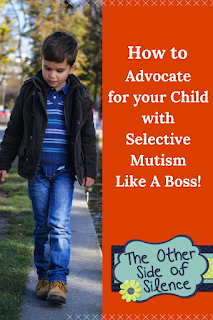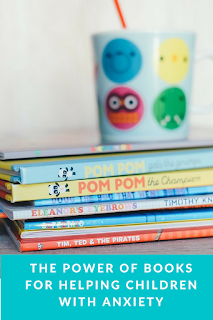Before we figured out that Thomas had selective mutism, we had some pretty bad playdates. Thomas would often be excited for his friend to come over, but once they did, he would shut down, have a meltdown or often just go to his room and shut the door, leaving me with the other parent and their child. Awkward! Needless to say I did not like having playdates. It wouldn't be until we went to a place that specialized in treating sm that I realized how important one-on-one playdates were for helping children develop friendships and become verbal with peers. I also learned that there were actual strategies you could use for playdates to help make it go as smoothly as possible.
When
we began treatment for Thomas's selective mutism, one of the first things we were
told was to implement one-on-one playdates with children from his preschool. Of the many things that were involved with his sm cognitive behavioral therapy program, playdates were what I particularly struggled with. At the time we were in a private preschool twenty minutes
from our home where we dropped off, picked up
and rarely interacted with other parents from the class. The first thing that popped into my brain was
how would I not only strike up conversations about having playdates with moms I did not know during
the chaotic pick up and drop off, but then also invite these strangers and their child
over to my house. Did I mention I also had a newborn who was all of 3 months old at the time! The whole thing was completely out of my comfort zone, but I realized quickly that a lot of the cognitive behavioral therapy that needed to be done with Thomas would force me past my comfort zone and I needed to accept that. Besides we were asking Thomas to step WAY out of his comfort zone, so there was no question that I would do the same thing as his advocate.
We started having playdates about once a week. Some were harder than others, but over time they really got better and somewhere along the line we both stopped dreading them. Having these playdates really helped Thomas at school, because he now had formed friendships through the playdates that carried over to the classroom, lunchroom and playground. Almost 4 years later and fully verbal, Thomas has lots of playdates at our house and also at friends' homes. There was a time when I thought he would never be able to go to someone's house without me, so it is so wonderful to see him thriving and having a few really close friends. I really feel that one-on-one playdates helped him practice his social skills, develop friendships and boost his confidence. Here are my top 5 tips for helping your child with selective mutism have a successful playdate.
1. Seek children with a compatible personality This is true for any playdate, but it is especially important for a child with selective mutism. My first plan of action for helping my son was to speak to the teacher and teacher's aide to get a recommendation on which children in the classroom would be a good fit for Thomas. Did they share a love for trains? Did they interact nonverbally together in the class? Were their temperments the same? That was the easy part. The hard part was walking up to the parents of these children who I only greeted in passing to discuss the idea of a playdate. I was able to ask to parents this way, but I found that emailing them (we had everyone's email address on a parent info sheet) was a great way to explain our situation and what we were doing to help our son. The parents were very understanding and were actually excited to have their children get some one on one time with another classmate as well.
2. Hold the playdate in the home environment. As hard as setting up a playdate was, not knowing how the playdate would go was even more stressful. After all my effort, would Thomas have a meltdown? Refuse to interact? We were told by Thomas's selective mutism doctor that the home environment was the ideal place to do playdates, because he was most comfortable there and we could control the environment (no loud noises, crowds, or other things that gave Thomas anxiety). The few times we had met a playdate at a children's play place, Thomas would refuse to interact and the other child would end up playing with some other kid the whole time. Once Thomas had a lot of playdates at home and was doing well with them, we began having playdates outside the home.
3. Have ZERO expectation for speech. This is so important and often where parents, grandparents, teachers, and friends go wrong. Children with sm are very aware that they are unable to talk in certain situations and are extremely aware of when people are expecting them to speak. The irony is that the more you expect or want a child with selective mutism to speak, the more they will feel that expectation and have increased anxiety, and therefore shut down. It's a vicious cycle. When you are having playdates with your child's peer and their parent (your peer), you want them to see how fun and amazing your child can be and expectations can run high. The more you push, the more they'll shut down, so do your best to relax and not worry about what your child is or is not doing. Make sure all adults involved know that there should be zero expectation as well.
4. Have a planned activity/activities. A planned activity takes the pressure off the child to come up with something to do with the guest. It takes the focus off of talking and puts it on the activity. We had a lot of success once we began implementing this strategy. Of course nothing always goes as planned. Guests sometimes didn't want to do a specific activity, which is why my son and I would discuss a few different ones he liked prior to their arrival and then let our guest choose. Something we were told over and over again during treatment was that a child has to be comfortable in their environment before speech can even be attempted by a child with sm. Often activities that involved a lot of hand over/ take over tasks, team work or silliness would end up taking the pressure off my son and he would occasionally say a few words. I do caution that a planned activity should not involve toys that your child is protective of and might get upset sharing. We learned quickly to put away favorite toys before a playdate came over to avoid anxiety and meltdowns. Some playdate activities that worked really well for my preschool son at the height of his sm were:
- Baking- What kid doesn't love eating something yummy that they made!?!
- Sand Table - Lots of opportunities for sharing toys and interacting in one location
- Games that could be played together as a team- I Spy Board Game, Balloon Toss, Hide & Seek
5. Discuss playdate afterwards and celebrate success no matter how small. Make sure to praise your child for their brave effort and let them know that you were proud of them when they shared a toy, played a game, etc. Don't put any focus on the fact they they talked or didn't talk. It will often take several playdates with the same child before they will feel comfortable enough to speak freely. Ask the child how the situation felt and have them point to it on a scary chart. See my post about using a Scary Chart. This will help you and your child figure out what was hard about the playdate and how you can adapt for the next one.
Just like anything, the more opportunities your child has to practice interacting with a friend in a one-on-one playdate setting, the easier they will become. Our son who is now six is able to go off playing at his friends' homes or ours without any structured activities or guidance from me. The days of awkward playdates are now behind us and they can eventually be behind you. It is not easy, but if you take the time and put in the effort now to set up one-on-one playdates frequently with these 5 tips in mind, you can help your child form friendships and build confidence that will grow with them.
10 Strategies to Help Your Child with Selective Mutism Transition into the New School Year
What I discuss in my posts are based soley on our family's experiences and opinions. I am not a doctor or health professional and know others may have different experiences and opinions than my own.

















